Licensed merchandise sales total more than $187 billion at retail worldwide. While the United States and United Kingdom account for much of that income generation, Brazil is quickly emerging as a global player, factoring highly
April 6, 2018
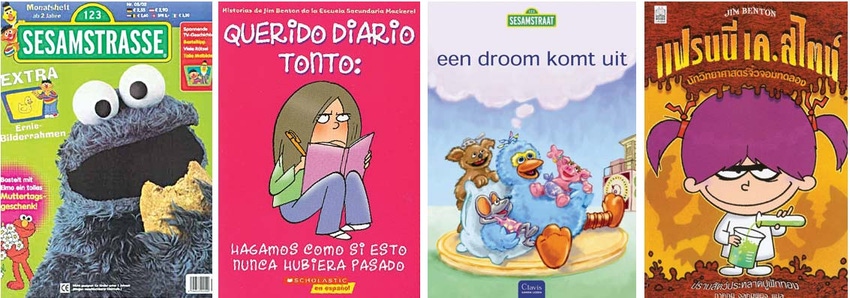
Licensed merchandise sales total more than $187 billion at retail worldwide. While the United States and United Kingdom account for much of that income generation, Brazil is quickly emerging as a global player, factoring highly in sales accumulations. 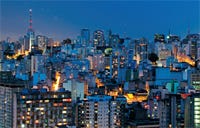
Recent estimates by ABRAL, Brazil's equivalent to the International Licensing Industry Merchandisers' Association (LIMA), peg licensed goods sales as exceeding $2.27 billion at retail, a number that continues to rise due to increasing standardizations of data processing and collecting on behalf of the organization, as well as a strong economic climate.
That estimate could even be under reported by 20-30 percent, says Marcio Domingues, vice president of ABRAL and managing partner/CEO of OmNi E+ Marketing & Licensing, Ltda., a subsidiary of Omnicom Movies. OmNi E+ distributes and markets the rights to more than 2,000 feature films, TV series and corporate brands across Brazil and Latin America. 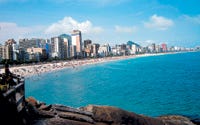
With overall retail sales in Brazil rising by more than 10 percent last year over 2009 according to findings published by Bloomberg, the growth is not expected to slow, and not just in Brazil's largest markets of Sao Paulo or Rio de Janeiro.
According to Domingues, retail growth is strongest in the south, but there is also growth in consumption and production coming from the north east and center west of the country.
The Brazilian market is seeing great gains, "fueled by record low unemployment and credit expansion," states the Oct. 2010 Bloomberg report.
Sales from the Brazilian self-service sector totaled $121 billion in 2010–that's a 13.9 percent rise from 2009–while sales from the top 20 Brazilian companies rose more than 20 percent to $70.18 billion last year. 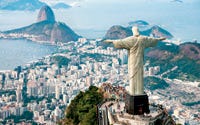
Number one Brazilian retailer Pao de Acucar, which has 1,800 stores and is majority-owned by France's Casino, saw revenues of $21 billion in 2010. Carrefour, which operates 500 stores and owns the Dia chain, reported $17.6 billion in sales, while Walmart, which also operates Walmart Supercenters, Sam's Club, Todo Dia, Sonae (Mercadorama, BIG, Maxxi Atacado and Nacional) and Bompreco (HyperMarket, SuperMarket and Magazine), reported $13.3 billion in sales across its more than 450 stores.
Regional retailers G. Barbarosa reported $2.2 billion in sales for its 50 stores. Other major retailers in Brazil include Lojas Americanas (toy and home entertainment); Ri Happy and PBKids (toy); Casas Pernambucanas, Renner and C&A (apparel); Ponte Frio (electronics); Casas Bahia (homeware) and Saraiva e Siciliano (publishing and music).
These total sales figures are translating extraordinarily well for sales figures related to licensed products.
"Over the past 10 years, as soon as retailers started reporting and speaking with associates, we have seen growth rates of 4 percent a year," says Domingues. "The growth rate has been phenomenal, but bare in mind, I think this is understated."
Among retailers, the most influential for licensed properties are C&A, Riachuelo and the Pernambucanaso outlets, says Domingues.
Major licensed properties span across all categories including apparel, toys, stationery, accessories (footwear and handbags), food and beverage, publishing, personal hygiene, entertainment and beauty products.
Apparel properties account for more than 21 percent of the market, with toys (12 percent) and stationery (11 percent) following close behind.
According to ABRAL and Brazilian-based licensing agency Redibra President David Diesendruck, major properties emerging are varied. Redibra, a 45 year veteran in the licensing industry, has built upon its influential reputation, holding some of the world's largest properties including Disney, Cartoon Network, Coca-Cola and Lucasfilm.
Strong licensed properties in Brazil include children's entertainment property Ben 10, which is quite popular, as is SpongeBob SquarePants, Bakugan, Pucca and domestic-born Monica's Gang. Other strong properties include Hello Kitty, local rock band Restart, Woody Woodpecker, Barbie, Hot Wheels, Strawberry Shortcake and Princess.
Domestic properties seeing growth include Menina Maluquinho (publishing), Passione (entertainment/TV), Xuxa (celebrity) and Red Nose (apparel). 
Major fashion licenses that have a presence in Brazil are typical–DKNY is strong, as is Polo by Ralph Lauren, Pierre Cardin and Christian Dior.
As of 2009 (the last year reported by retailers–a new study is currently being conducted by ABRAL), there were 2,996 licensing contracts in existence in Brazil for nearly 750 properties held by 839 licensees. Domingues estimates that there are more than 90 licensing agencies currently operating in Brazil, with global corporations including Warner Bros., Disney Consumer Products, Mattel, Hasbro and Sanrio each housing private operations within the country. 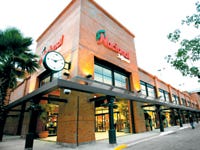
"The Brazilian market is becoming more and more sophisticated," said Diesendruck. "Licensees and retailers know what to expect from a licensor. As new licensees arrive, they must be prepared to deliver the same resources and service that they would deliver in the U.S.: great style guides, product development support, trade show materials, sales incentive campaigns and coordinated initiatives at retail." 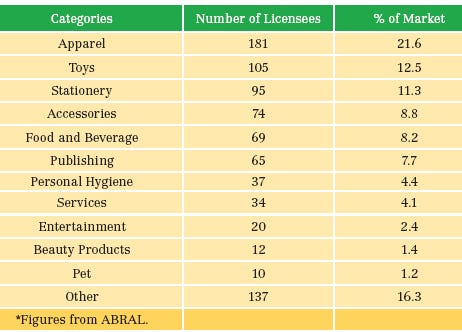
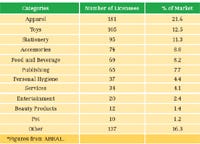
Moving further into 2011 and beyond, Diesendruck forecasts the continued growth of the aforementioned categories, corporate branding, adult-centric properties and also sports licensing, especially in relation to the upcoming World Cup in 2014 and 2016 Olympic Games. Diesendruck also suggests that Brazil's hot domestic properties will take off globally.
"Local content including animation, design and lifestyle are also becoming very strong," says Diesendruck. "Brazil become a 'cool' country worldwide not only from an economic perspective but also from a cultural influence as well. Brazilians are proud about themselves and how the world is praising us. I believe that quite soon Brazilian properties will make it big time outside of Brazil."
You May Also Like






